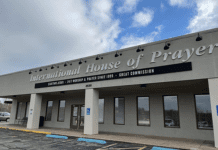But he admits there are some demographic markers in the two groups. Younger church leaders are generally more Calvinist than the older generation of pastors.
Roberts has a unique perspective on this point of contention. He feels like he’s “split down the middle” as a non-Calvinist, millennial pastor.
He is part of the SBC’s Young Leaders Council. The group just finished work on a survey of young SBC pastors. They’ll be presenting their findings in Dallas at the SBC’s annual convention.
ERLC highlighting social justice agenda among Southern Baptist churches
He says the survey revealed the ERLC to be “a spearhead of the divide.”
According to the survey, younger pastors “give great value to the ERLC…a calvinistic led entity.”
“The appearance is they (ERLC) care more about social justice and they don’t push as heavily, not as much press for pushing the pro-life movement. They are a pro-life organization but don’t push it as much as the older generation.”
It is on the abortion point that it’s easiest to explain the soteriological differences between the two camps. Although it is not the main point of disagreement, it does explain elevating social issues over pro-life views. Roberts points out, “Reformed have a more harsh view on the condition of accountability than do non-Calvinists. Reformed to the nth degree don’t believe every baby is going to heaven.”
“So the older generation frowns upon the ERLC because they don’t like this social justice stuff.” Roberts believes, “The ERLC is the most divisive when it comes to generation divide. I hardly know of any older pastors who glean much from the ERLC, but a lot of younger pastors do. The whole social justice movement has pitched a flag in the calvinist camp. I don’t know why that is.”
Roberts finds some evidence of the theological differences at the North American Missions Board. “They’ve shrunk their evangelism department significantly and it’s resulted in the precipitous decline in baptisms and some would argue that’s due to a lack of emphasis on evangelism from state conventions and NAMB. Others would say that it’s due to the increasing presence of Reformed theology.”
There is yet another nuanced theory for the evolution of the SBC. It comes from Dr. Nathan Lorick, Executive Director of Colorado Baptist Convention. He is the youngest leader in that role in the SBC.
He says the divide is not generation nor theological—it is ideological.
What should Southern Baptist churches look like in the future?
“If there is any major division, it falls along the ideology of what the SBC needs to look like future and how we get there,” Lorick says.
Lorick says everyone involved has signed off on the Baptist Faith and Message 2000, the SBC’s statement of faith, and it ‘gives us the parameters to walk in unity and gives us room to differ.”
He believes the SBC has to change.
“We’ve been in decline, we can’t afford to stay the same. We have to change to reach the next generation. Social issues are some of those areas that need to change.”
But he doesn’t see that view as divisive, stating a “vast majority of those in the SBC believe we must be involved in social justice issues from a biblical standpoint. It’s our responsibility.”
“We ought to pay attention to them and fight for what’s biblically right in them, while remembering that we are a gospel people. Social justice issues are a part of the gospel, but there’s more to the gospel than just that. Our focus has to stay on the gospel, on planting churches, witnessing to unreached people groups. We can’t drift from the mission we were created for but we can improve on the ways we carry it to a new generation.”
All three of the SBC leaders had ideas on how to bridge the gap, no matter what its cause.
Dr. Hemphill wants to see more organized mentoring, perhaps even a mentoring network that will match mature leaders with young pastors.
“Where there are riffs, the way to break it down is one on one.” And citing 1 Corinthians 12 he points out, “The scripture is clear that we need both young and old. It’s not either-or, it’s both.”
Dr. Roberts says, “There has to be a heavier emphasis to agree to disagree over these tertiary theological issues while uniting under the Baptist Faith and Message 2000 to reach our friends and neighbors for Christ.”
But he adds, it would be ignorant to deny that there is a divide out there.











